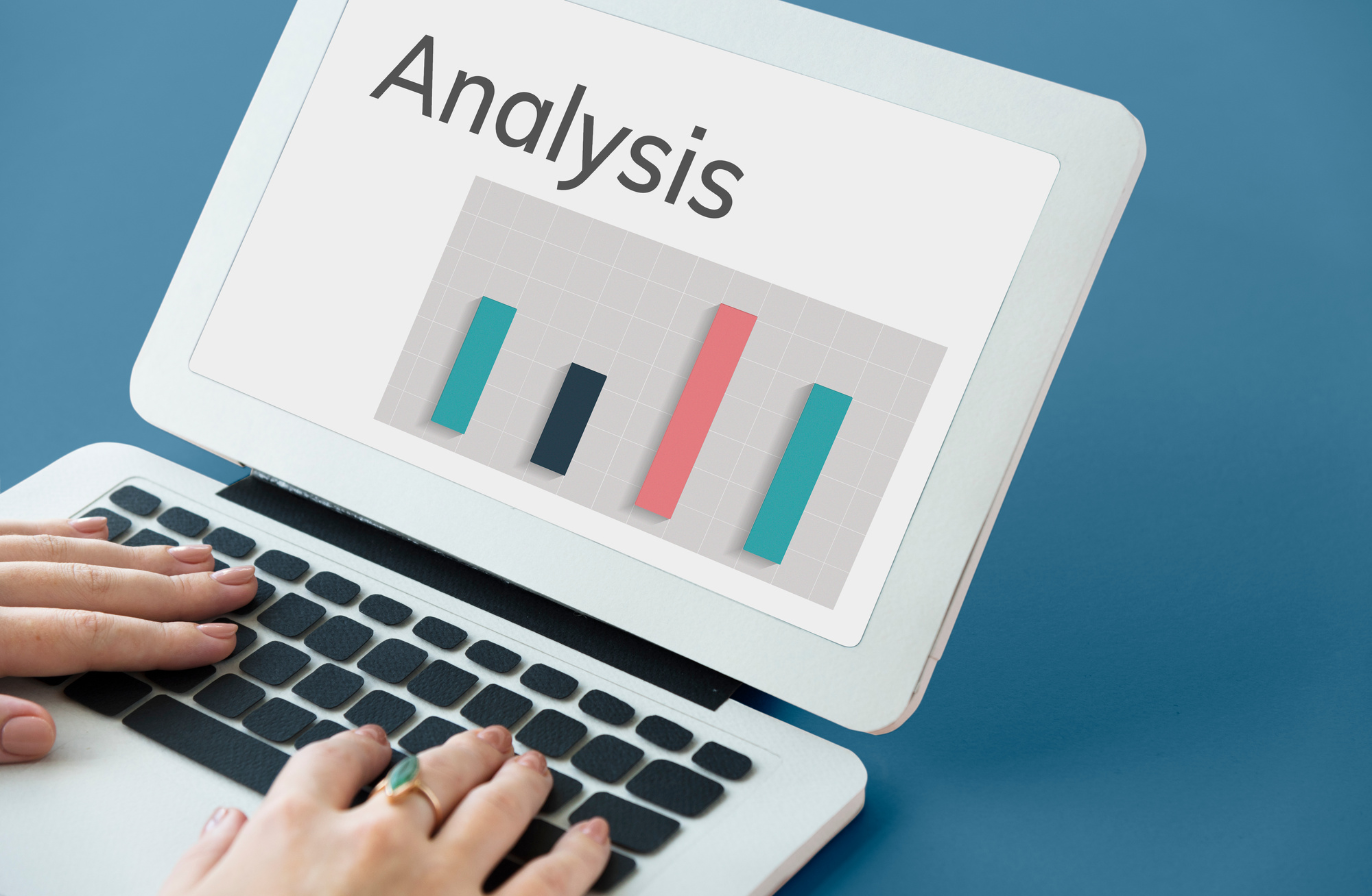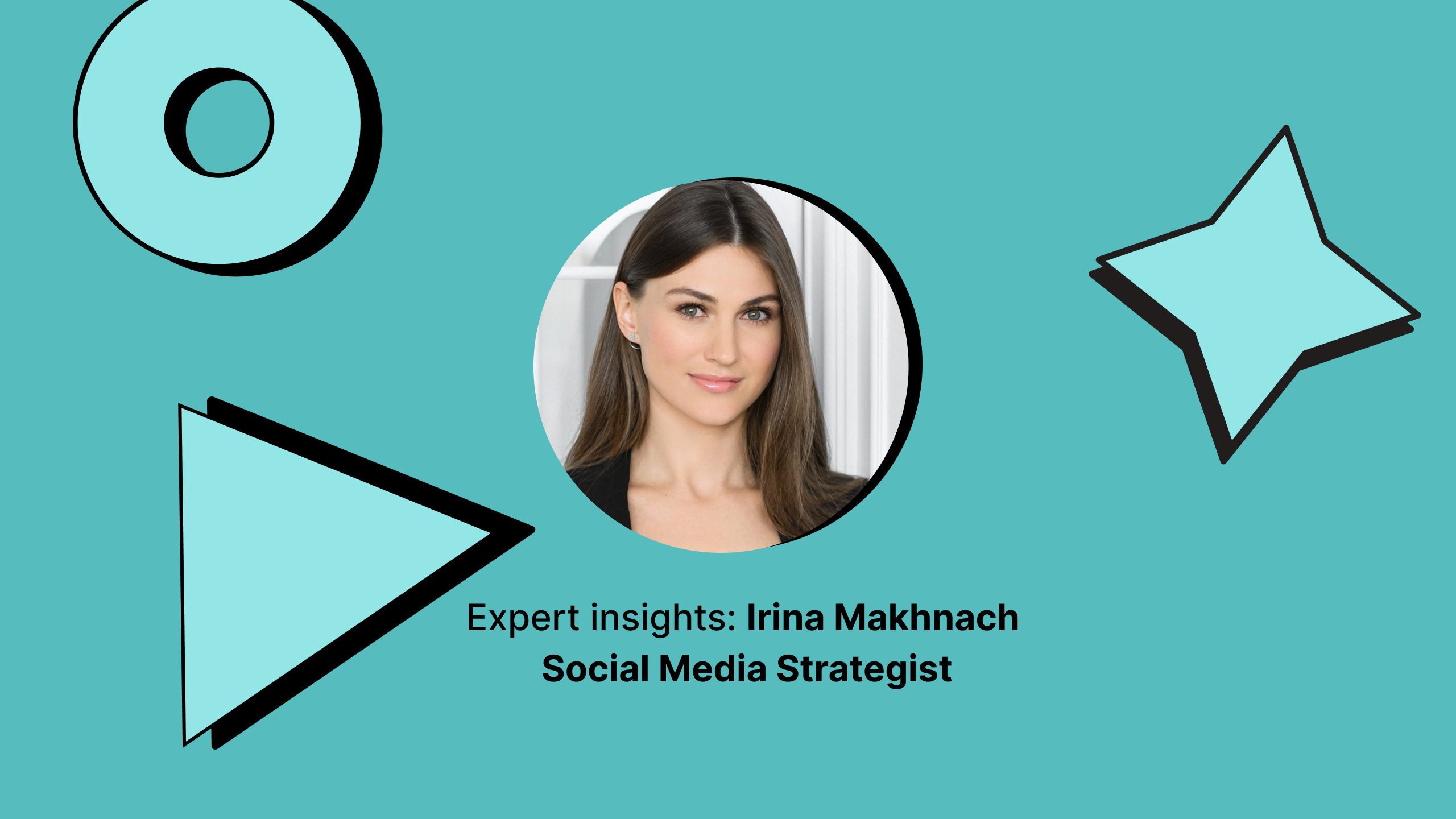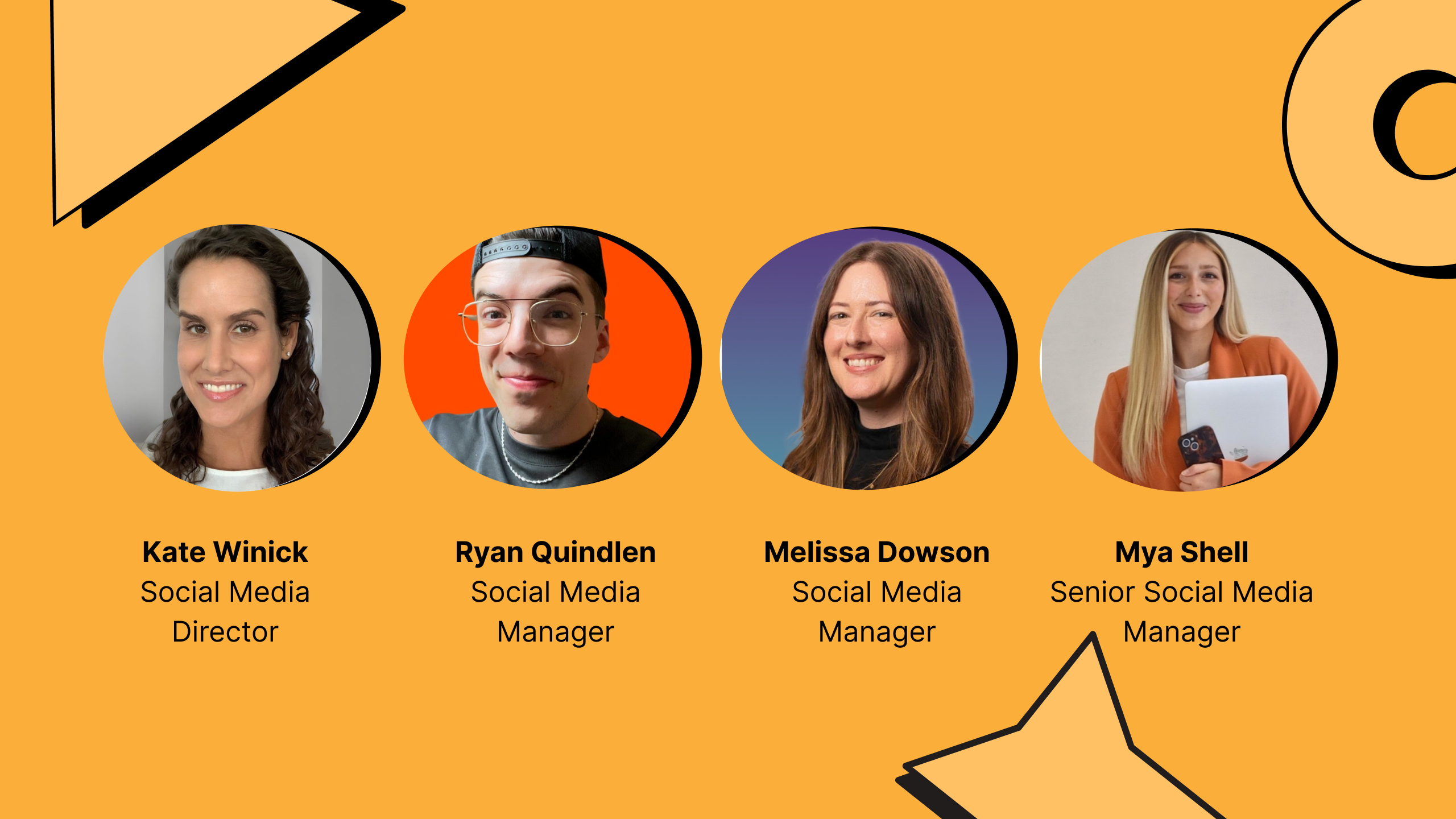AI in Social Media: Practical Uses for Marketing Experts
Explore the impact of AI in social media, and learn how to enhance user experience, content creation, and targeted advertising.

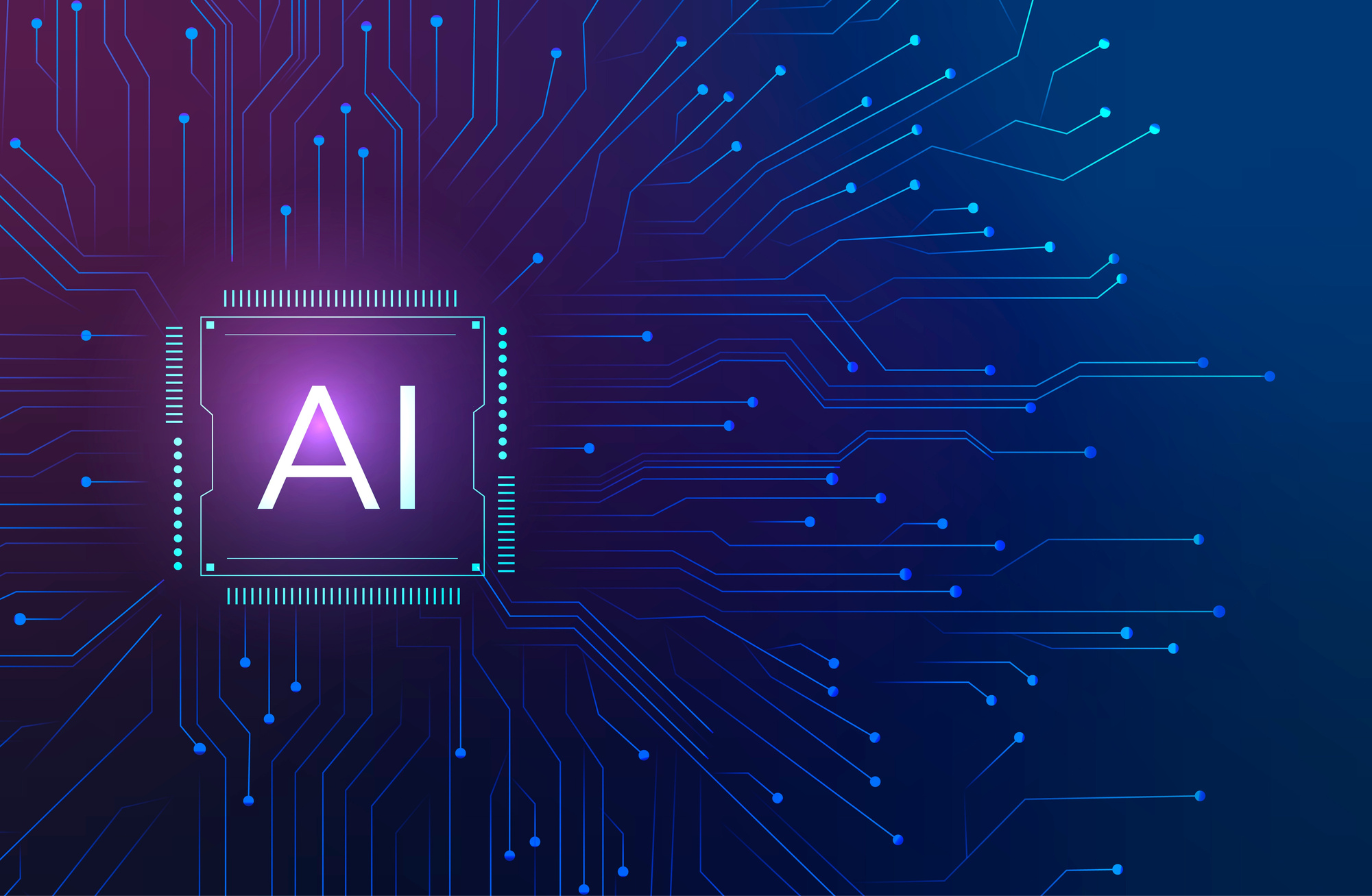
Managing social media today means wearing about five different hats at once.
But what if there was a way to make it easier?
AI in social media is transforming the way we approach strategy, automation, and reporting.
In this article, I’ll show you how using AI for social media management can simplify your workflows and reduce manual tasks, and also how different social media AI tools can help you make data-driven decisions that will impress your leadership team.
Key takeaways
- How to use AI to fuel your social media marketing efforts? AI fuels social media marketing by accelerating content creation, enhancing analytics, and helping marketers make faster, more informed strategic decisions.
- What are some AI-driven social media marketing best practices to keep in mind? To use AI effectively, brands should pair automation with transparency, avoid bias, and always layer human creativity and authenticity on top of AI-generated work.
- What’s the future of AI applications on social media? The future of AI in social media is predictive, adaptive, and ethically driven—where AI anticipates trends, personalizes content in real time, and supports more responsible data use.
How to use AI to fuel your social media marketing efforts?
The smartest marketers aren’t asking if they should use AI anymore. They’re figuring out how to use it well.
Mastering how to use AI in social media analysis means digging into the why behind audience behavior, not just the what.
AI can spot patterns we’d never notice manually, but it still needs human instinct to turn data into stories that resonate.
And when it comes to how to create social media content, AI makes the perfect creative sparring partner. It helps you test ideas faster, fine-tune your tone, and catch trends before your competitors even see them coming.
So, here are the top ways to use AI in marketing:
For content creation and optimization
Even the most seasoned marketers hit creative roadblocks. And that’s exactly where AI can save your social media content strategy.
Think of it as your creative co-pilot: fast, tireless, and surprisingly good at helping you see new angles you might’ve missed.
Text generation for captions, posts, and copy variations
AI tools make an excellent starting point when you need to brainstorm ideas or test new tones.
With the right AI prompts for social media, you can create endless caption styles, ad headlines, or post intros in seconds.
But here’s the trick: don’t let AI write for you; let it write with you.
The first draft it gives is just raw material. Add your brand’s voice, sharpen the punchlines, and you’ll suddenly find content ideas coming faster and flowing smoothly.
AI image generation and editing tools for social media
Visuals drive the scroll. And AI can help you produce them faster without sacrificing quality.
You can experiment with different color palettes, styles, or even create quick mockups to test campaign ideas before looping in designers.
Tools like Midjourney or Adobe Firefly are perfect for early-stage visual brainstorming. However, I still recommend you use these tools to get the creative juices flowing, not to skip the creative process altogether.
Video content creation with AI (scripts, editing, subtitles)
Video is the backbone of social media right now, but it can eat up your entire schedule.
AI helps speed things up by drafting scripts, generating hook ideas, trimming clips, and adding subtitles automatically.
Start small: repurpose your best-performing posts into short videos, use AI to edit and subtitle them, and test variations to see what lands best with your audience.
AI works best as acceleration, not replacement. Use it to pull insights from customer conversations, brainstorm content angles, and help draft first passes. But the stories and point of view still need to come from the person. The content that performs today has a human fingerprint + your own unique taste. AI should make your perspective sharper, not more generic. - Lindsay Rosenthal
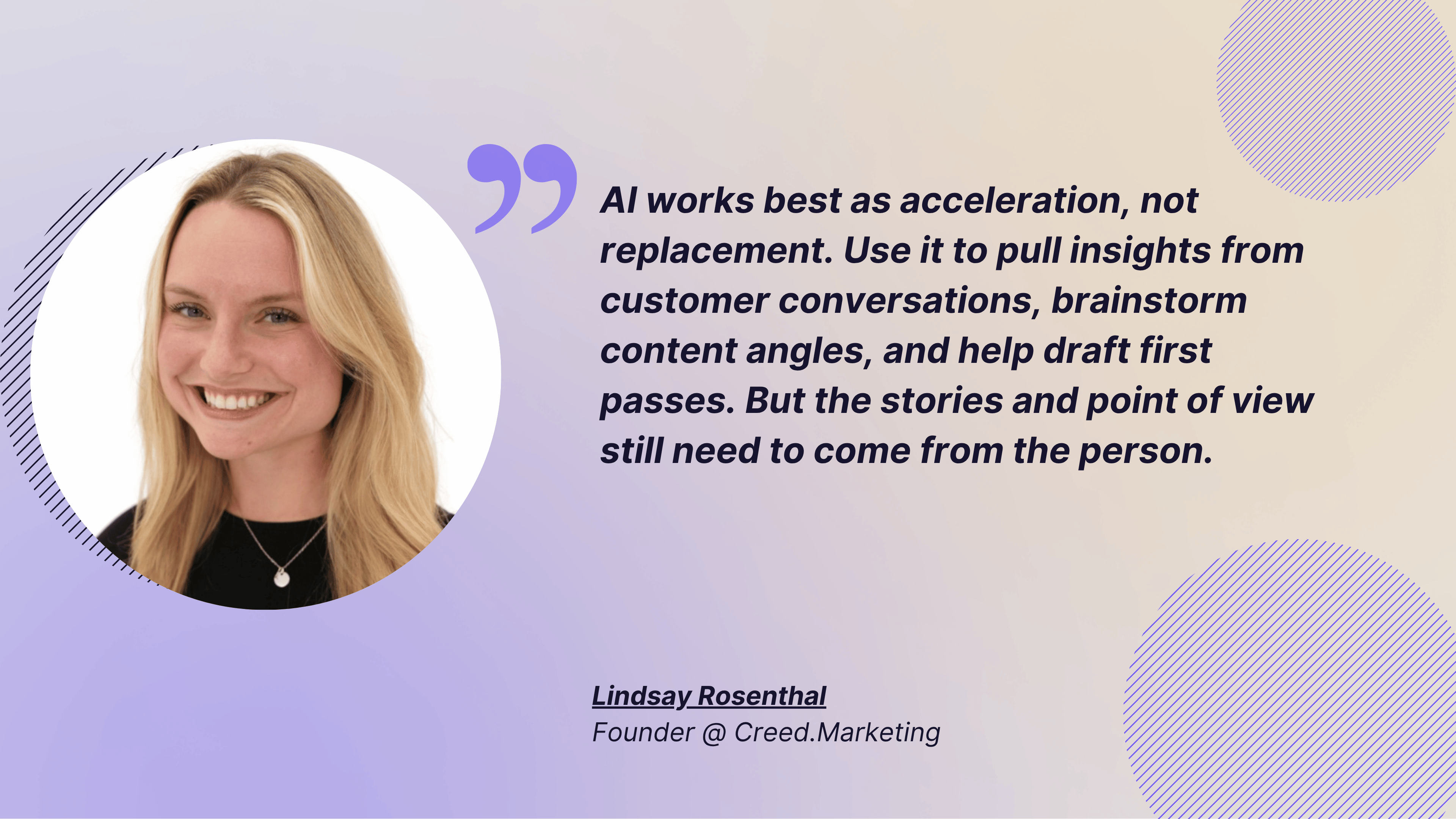
For analytics insights and competitive intelligence
AI has turned social media analytics from reactive reporting into real-time intelligence.
You can now understand why something worked and predict what will next.
The best part? These insights feed directly into your strategy, helping you stay one step ahead in an increasingly competitive space.
AI audience insights
Your audience isn’t one big crowd. It’s a mix of micro-segments with different motivations, habits, and triggers.
Here are a couple of AI analysis lenses I try when I need insights about my audience:
- AI-powered audience segmentation: It lets you group users based on engagement behavior, content preferences, or purchase intent, revealing which types of followers drive the most value.
- Demographic and psychographic analysis: AI connects surface-level data (like age, gender, or location) with deeper motivators: interests, tone preferences, and emotional drivers that shape how they interact with your brand.
- Content recommendation engines based on audience data: Content recommendation engines analyze audience data to show what resonates most, from topics to posting times.
- Predicting audience behavior and preferences: The top AI-powered social media analytics tools help you forecast shifts in engagement, like when followers are most active, what trends they’ll respond to, and which content pillars are gaining momentum.
AI-based performance analysis and competitive benchmarking
Want to know if your strategy is really working? Benchmark it.
Let me quickly show you how AI tools now make competitive monitoring not only effortless but deeply insightful:
Identifying competitor content strategies with AI categorization
AI tools can aggregate and compare metrics from your pages and competitors, providing competitive insights into engagement, reach, impressions, and audience growth.
This helps you uncover what’s driving your competitors’ performance and identify opportunities or blind spots in your own strategy.
Platforms like Socialinsider take this further through their AI-based industry social media content pillars feature, showing which themes dominate your market and how each brand performs across them.
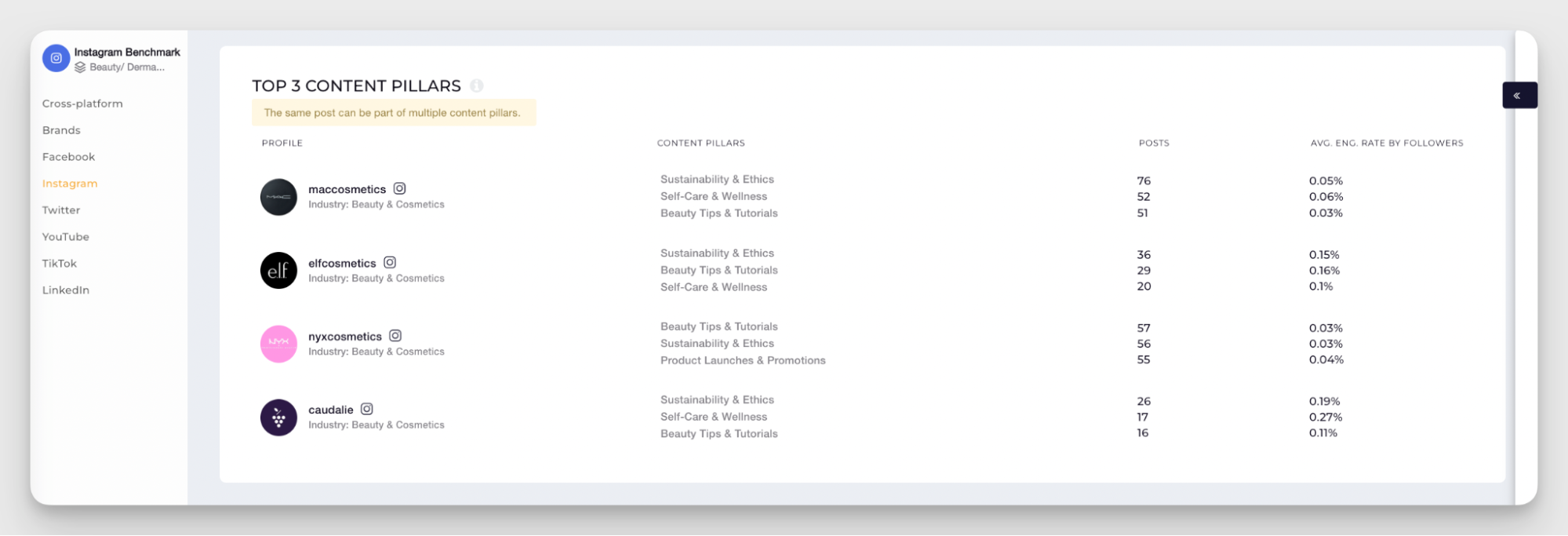
AI-powered trend detection and prediction
AI can automatically analyze captions and classify posts into key social media content pillars—the core topics that define your brand voice.
This reveals which themes drive the most engagement and helps marketers refine content strategy over time.
You can even manually or auto-tag posts by keyword or hashtag to track performance on a granular level.
One thing that I love about Socialinsider’s Key Insights Summary is that it automatically compiles clear, actionable insights, not only for your brand’s multi-channel performance but also for competitive analysis.
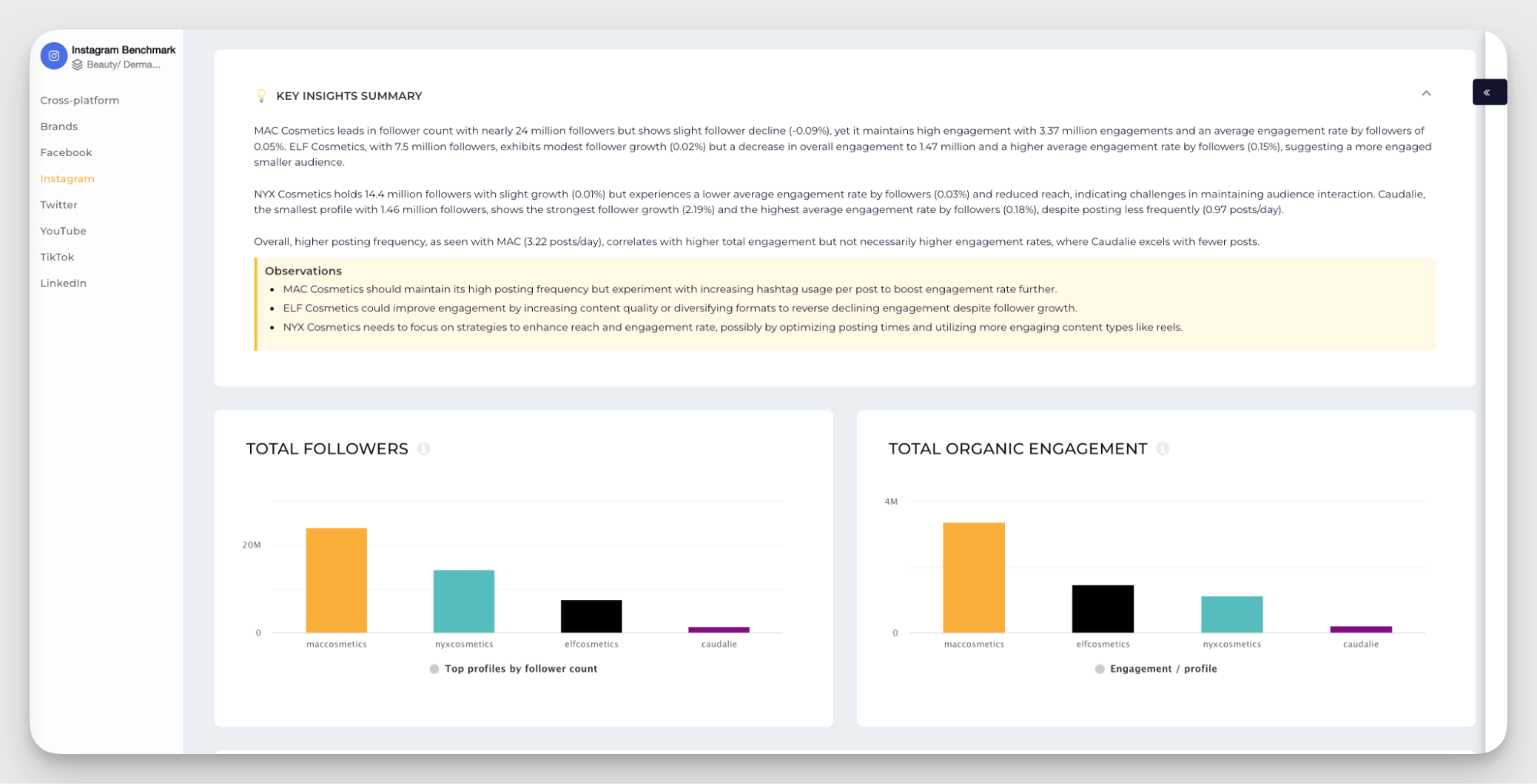
Identifying patterns that human analysts might miss
The beauty of AI is in its attention to nuance.
It spots correlations and trends invisible to the naked eye. Whether it’s a subtle engagement dip tied to posting time or a recurring sentiment pattern across campaigns, AI helps surface the why behind the data.
And here's how Socialinsider's AI comes in handy: it enables you to interpret performance insights, summarize key findings, and even suggest next steps in plain language. Stay tuned. This will change how you use analytics forever.
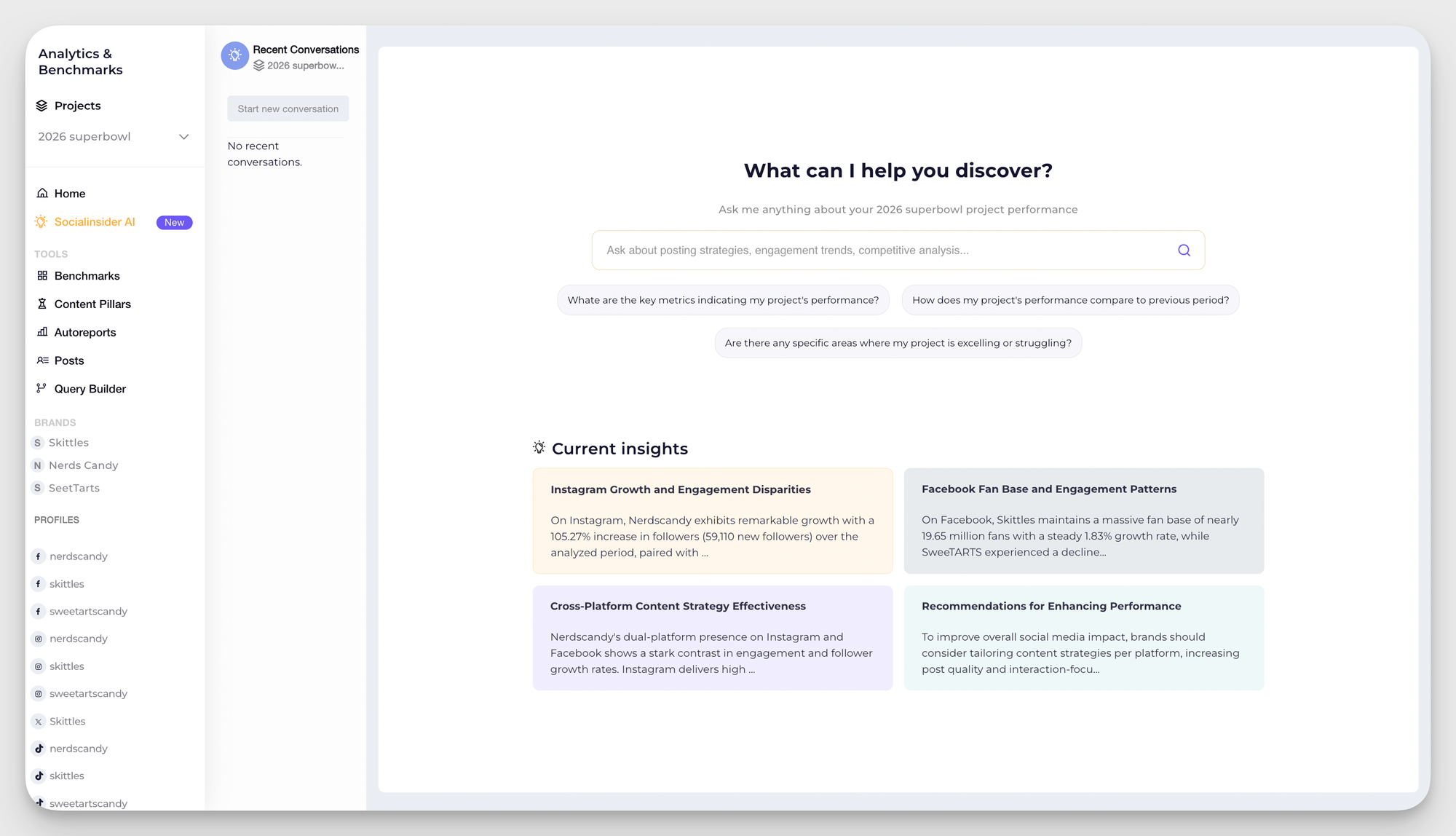
For social listening and brand monitoring
Your brand’s reputation lives in what people say about it.
That’s why social listening isn’t just a nice-to-have anymore; it’s one of the most powerful ways to understand the real impact of social media on business.
AI takes it to the next level by cutting through the noise and surfacing what actually matters:
Sentiment analysis
AI-powered sentiment social media analysis helps you track how people feel about your brand in real time.
It picks up on emotional tone, keywords, and even emoji usage to help you see if your audience is hyped, frustrated, or indifferent.
But the real value comes from connecting those insights to strategy.
By analyzing historical data, AI can identify the best times to post, top-performing content types, and most effective hashtags.
One thing I really think is smart is that it can even recommend which content pillars or campaigns to prioritize based on engagement and reach, giving you a more data-driven way to plan your next move.
In other words, if you’ve ever wondered how to measure social media success, this is where you start: not with vanity metrics, but with audience sentiment and long-term engagement patterns.
AI spotting emerging trends before they peak
AI is like your early-warning radar for what’s about to go viral.
While some social listening features are limited by platform APIs, AI tools can still track mentions, hashtags, and influencer activity across multiple platforms, spotting shifts in conversation before they explode.
You can set up auto-tagging rules to monitor specific campaigns, keywords, or collaborations, and let AI analyze their impact on your brand visibility.
This kind of proactive insight lets you jump on trends while they’re still forming, instead of trying to catch up once everyone else is already there.
For quicker customer service
No one enjoys waiting for a reply on social media.
The faster you respond, the more credible and human your brand feels.
But keeping up with DMs, comments, and mentions across multiple platforms?
That’s a full-time job on its own.
Luckily, this is where AI and social media marketing start working in perfect sync, helping you stay responsive and sane.
AI chatbots for streamlined conversations
Modern chatbots are light-years ahead of those stiff, robotic versions from a few years back.
Personally, I’ve been pleasantly surprised to see that today’s AI chatbots can recognize intent, detect tone, and even carry on natural-sounding conversations that feel surprisingly human.
They can handle FAQs, order updates, or returns instantly, freeing up your team to focus on the complex, human-to-human moments that actually build loyalty.
Automated spam and toxic comment detection
If your social feed is growing, so is the noise that comes with it.
Spam bots, trolls, or random negativity can kill the vibe of an otherwise great post.
AI moderation tools can filter through thousands of comments in real time, flagging or removing anything off-brand, harmful, or inappropriate before it spreads.
That means your target audience sees more of the meaningful conversations and you spend less time firefighting drama in your DMs.
For optimized paid advertising
AI has completely changed the way smart marketers approach paid ads, not by throwing money around faster, but by helping you spend it smarter.
If you’ve ever felt like you’re guessing which campaign will perform best, you’ll love what AI brings to the table, trust me.
Lookalike audience generation with AI
Thankfully, the days of broad, spray-and-pray targeting are over.
AI digs through patterns in your existing social media target audience: their interests, behaviors, even micro-signals like comment sentiment—to build accurate lookalike groups.
This kind of social media audience analysis helps you reach people who don’t just look like your followers, but think and buy like them.
It’s how you keep ad spend efficient while growing reach in a way that actually converts.
Predictive campaign performance analytics
Instead of waiting until the end of a campaign to see if it worked, AI helps you forecast performance from the start.
It can identify which creatives, platforms, or copy styles are most likely to drive clicks and conversions before you even hit publish. How great is that?
Real-time campaign optimization recommendations
We’ve all been there: watching ads underperform and wondering what to tweak first.
AI takes that stress off your shoulders by continuously analyzing performance signals and suggesting specific actions: adjusting budgets, swapping creatives, or refining targeting.
You still call the shots, but now you’re reacting faster and with sharper insights.
ROI forecasting with AI
AI-driven forecasting tools give you clarity on what really matters: where your next dollar should go.
By combining historical campaign data, audience insights, and market trends, AI can project likely social media ROI for each campaign or ad set.
How to choose the right tools for social media marketing optimization through AI?
As it usually happens, a social media strategist balances multiple priorities, from content creation to reporting on campaign performance.
But with the overwhelming number of AI and social media tools available, how do you know which ones will actually make a difference?
Let me walk you through how to determine the right time to invest in specialized AI solutions and what features will truly drive results for social media optimization.
When to invest in specialized AI tools?
There comes a point when generic AI tools can’t keep up with your specific workflows. That’s when specialized solutions start paying off.
Industry-specific AI needs
If your business operates in a specific sector, the standard one‑size‐fits‐all tool may not cut it.
For example, if you’re working in B2B social media marketing, you’ll want a platform that handles longer sales cycles, account‑based social tactics, deeper analytics, and perhaps extended LinkedIn performance data.
Specialized AI competitive analysis tools can help you track engagement, optimize content strategies, and drive lead generation more effectively.
Platform diversity: managing 3+ social channels
When you’re covering multiple social channels, the workload and coordination jumps.
That’s when using AI for social media can become a force‑multiplier: consolidating scheduling, analytics, content suggestions and repurposing.
The breaking point: manual processes vs. time-to-insight
If you’re still relying on annual or quarterly social reviews and vast spreadsheets, you’ll struggle to keep up, trust me.
The moment you find that it takes weeks to pull meaningful social media metrics for your executive reporting, it’s a signal: you need an AI‑powered system that gives near‑real‑time clarity, instead of manual effort and delays.
To help you solve this, I asked Lindsay Rosenthal, Founder of Creed.Marketing, how does she handle this process. Here's the piece of advice she gave me:
Start with the bottleneck you need to solve, not with the tool. Is the issue idea generation, editing, repurposing, or scheduling? Identify the friction point, then choose the tool that reduces that specific friction. Most people get overwhelmed because they try to adopt everything at once.
Key features to look for in AI-powered platforms
When selecting an AI-powered platform for data driven marketing, it’s essential to choose one that adapts to your needs and enhances your workflow.
Here are some crucial features to consider, according to Lindsay:
- The platform should learn your voice over time.
- It should allow fast editing and feedback loops.
- It should accept many forms of input, not just a prompt box.
- It should reduce steps in your workflow, not create new steps.
- It should be evolving and improving all the time.
AI-driven content analysis and categorization capabilities
Your platform should be able to not only track your content’s performance but also analyze it for patterns, engagement, and trends.
My advice? Look for tools that offer deep insights into the content you post and categorize it in ways that help shape your social media strategy.
Competitive benchmarking and intelligence features
Being able to compare your performance with competitors is invaluable.
AI in social media marketing should provide competitive benchmarking, so you can see how your social media efforts measure up in your industry.
"Socialinsider provides a good foundation of being able to analyze at a high level the social space for a certain industry or certain competitive set or influencer set and adding on additional tools that you have helps formulate a kind of social strategy based on facts." - David, WPP Media
Cross-platform analytics and unified dashboards
Social media managers often juggle multiple platforms, I know.
A platform with cross-channel analytics can provide unified dashboards for seamless insights across all your social accounts.
One thing that was great from Socialinsider was that they have data for TikTok, YouTube, Facebook, and Instagram - and those are our main platforms right now. - Augustin, Impremedia
Automated reporting and custom metrics
The ability to schedule automated reports and customize metrics is a huge time-saver.
AI platforms should let you generate multiple report types, so you can present social performance in a way that aligns with your objectives.
Luckily, Socialinsider’s automated report generation feature streamlines the process and ensures you have reliable data ready to share.

Predictive analytics and performance forecasting
Look for platforms that provide predictive AI social media analytics to forecast trends, engagement, and overall performance.
This feature allows you to make proactive decisions, instead of reactive ones.
When it comes to social media analytics, I think Socialinsider is the best one. Using it, it was really easy for me to understand everything. - Gabriel, Intelligencia Audiencia
Integration capabilities with your existing tech stack
Ensure the platform can seamlessly integrate with your current tools.
Whether it’s through social media APIs or third-party app connections, the AI tool should work alongside your existing tech stack.
Guilherme, from Telefonica said: Socialinsider has an integration with Looker Studio from Google, the database solution...it's been working wonders here.
Data accuracy and real-time updates
For any platform to be valuable, the data it provides must be accurate and timely.
Choose AI tools that offer real-time updates, so your insights remain relevant and actionable.
Sentiment analysis and audience insights depth
As mentioned earlier, a good AI platform will provide sentiment analysis to track how your audience feels about your brand and content.
It should also give deep insights into audience behaviors, preferences, and demographics.
Proprietary metrics that drive strategic decisions
Platforms like Socialinsider offer proprietary metrics, such as Organic Value.
This metric helps you understand the real impact of your organic content across different platforms.
Unlike basic engagement metrics, Organic Value measures the actual business value your content generates. It looks at things like brand awareness and the effectiveness in generating actions, giving you a clearer picture of your content’s effectiveness.
For example, in B2B social media marketing, understanding the organic reach and engagement across platforms like LinkedIn can directly correlate to lead generation and sales pipeline growth.
Basically, Organic Value allows you to track how well your content is performing within your specific B2B vs B2C marketing goals, helping you make informed decisions based on measurable results.
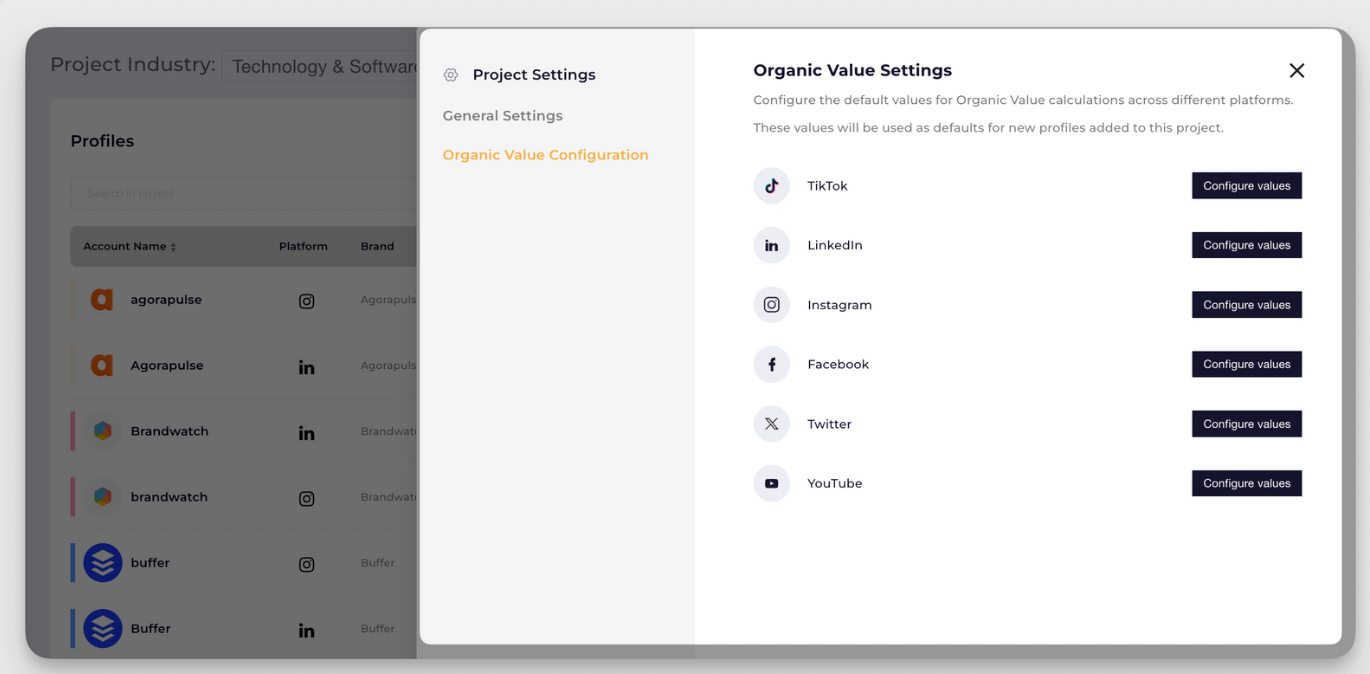
So, instead of relying on gut feeling or vague assumptions, use these metrics to provide actionable insights that align with your business objectives.
AI-driven social media marketing best practices to keep in mind
Let’s be honest.
Using AI for social media marketing can make your strategy look effortless, but feel a little too automated if you’re not careful.
The trick is using it to enhance your voice, not replace it.
Here are a few things I’ve learned (sometimes the hard way) that help keep things both smart and human:
Disclosing AI-generated content
People can tell when something feels off.
And hiding the fact that AI helped you write, design, or caption something just fuels that feeling.
Take it from me: transparency builds trust.
If AI helped you brainstorm ideas or polish your copy, say so. You don’t have to slap a disclaimer on every post, but you can weave it into your tone.
Avoiding AI bias in content and targeting
AI learns from data. And data isn’t perfect.
What does this mean?
Well, if you’re not actively checking what it’s learning from, you could end up reinforcing stereotypes or excluding parts of your audience without realizing it.
I’ve found it helps to review AI-generated captions or audience segments the same way you’d review a human teammate’s work.
Ask: “Who might this unintentionally miss or misrepresent?” A quick gut check like that can save you from tone-deaf moments later.
Maintaining brand authenticity with AI
AI is great at efficiency. But authenticity isn’t something you can automate.
It’s in the quirks: the inside jokes, the brand voice that sometimes breaks grammar rules on purpose, the moments that make people think, yep, that’s so us.
Use AI as your co-pilot: let it draft ideas, spot patterns, or analyze trends, but always run everything through your brand filter before it goes live.
I like to ask myself one simple question before approving AI-assisted social media content: Would this post still sound like us if people knew a bot helped write it? If the answer’s yes, you’re in the clear.
What’s the future of AI applications on social media?
If you’ve been wondering how to use AI for social media beyond just automating captions or scheduling posts, the real answer lies in what’s coming next.
The future of social media is heading toward intelligent collaboration, where AI doesn’t just assist, but actively shapes creative direction, strategy, and engagement.
Emerging AI trends to watch
We’re moving into an era where AI will shift from reactive to predictive.
Soon, tools will analyze behavior patterns and anticipate what kind of content will perform best before you even hit Post.
Expect to see more adaptive storytelling. Content, visuals, and copy will evolve dynamically based on real-time engagement signals.
AI-driven sentiment tracking and advanced social media data collection will give marketers the ability to spot emotional trends and audience shifts instantly, rather than weeks later in a report.
But the biggest shift in the future of AI usage will be around responsible data use.
As algorithms become smarter, brands that prioritize transparency and ethical AI practices will build stronger, longer-lasting trust.
Balancing AI automation with human creativity
The more you explore how to use AI for social media marketing, the clearer it becomes: automation can enhance creativity, but it can’t replace it.
AI is brilliant at handling scale, timing, and optimization, yet human insight is what gives content heart, humor, and cultural relevance.
The sweet spot lies in collaboration.
Let AI handle the heavy lifting—trend analysis, content clustering, caption testing—so you can focus on the storytelling and emotion that make people stop scrolling.
That’s the real deal: a partnership between data-driven intelligence and deeply human creativity.
The brands that master both won’t just keep up, they’ll set the tone for what comes next.
Final thoughts
The rise of AI for social media marketing isn’t about replacing creativity.
The smartest brands are learning to use AI as a co-creator: helping them work faster, understand their audiences better, and turn data into real advantage.
As the tools evolve, the edge won’t come from who uses AI, but from who uses it thoughtfully.
Keep the human insight at the center, and let AI handle the heavy lifting.
FAQs on AI in social media
What are the advantages and disadvantages of AI in social media?
The main advantages of AI in social media include automating tasks like performance tracking, content creation, content scheduling, and customer support. AI can analyze large amounts of data together to predict trends and optimize your current content to improve ROI.
Of course, overreliance on AI can lead to a lack of a human touch in your social media content. Additionally, if you’re not feeding the AI tools data that is highly relevant to your brand, then you will end up with generic AI content that’s too similar to your competitors and doesn’t make your brand stand out.
Before incorporating AI in your marketing strategy, make sure to weigh all the pros and cons of AI in social media.
Analyze your competitors in seconds
Track & analyze your competitors and get top social media metrics and more!
You might also like
Improve your social media strategy with Socialinsider!
Use in-depth data to measure your social accounts’ performance, analyze competitors, and gain insights to improve your strategy.

